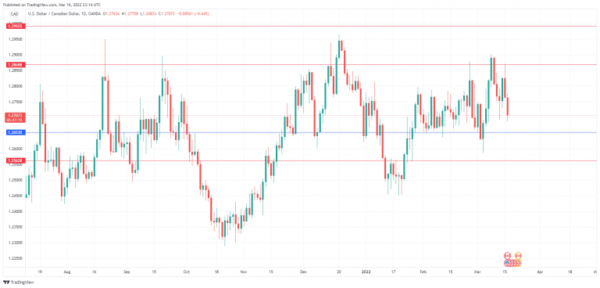The Canadian dollar has extended its gains into a second day. In the North American session, USD/CAD is trading at 1.2697, down 0.52% on the day.
Canada’s inflation accelerates
Canada’s inflation rate shows no signs of slowing down. Headline inflation rose 5.7% YoY in February, the largest jump since August 1991. This beat the estimate of 5.5% and was higher than the January reading of 5.1%. The Canadian dollar rose on the news, as the surge in inflation bolsters the case for the BoC to continue raising interest rates. Earlier this month, the BoC held off from raising interest rates.
Investors are expecting the Bank of Canada to respond in an aggressive fashion to red-hot inflation. The markets are projecting at least seven rate hikes of 0.25% this year, as the BoC will have to take off the gloves in order to bring inflation down to its target range of one-to-three per cent. The central bank will have to be cautious about the pace of its tightening, however. The CEO of Royal Bank, Dave McKay, has raised concerns the pent-up spending power of consumers could exacerbate inflation without boosting growth, which could lead to stagflation.
The Federal Reserve is widely expected to raise rates by 0.25% at today’s meeting. The Fed has telegraphed its intentions to the markets, but the move is still highly significant, as it marks the first rate increase since 2018. Investors will be combing through the rate statement and the dot plot, as well as Fed Chair Powell’s press conference. In this environment of huge uncertainty, the burning question is what does the Fed have planned next? Today’s move will be a launch for further tightening, but it’s unclear how fast the path to normalization will take. The FOMC is likely to project four hikes in 2022, which is considerably more dovish than the markets, which have priced in seven hikes this year.
USD/CAD Technical
- USD/CAD faces resistance at 1.2835 and 1.2934
- There is support at 1.2612 and 1.2488

